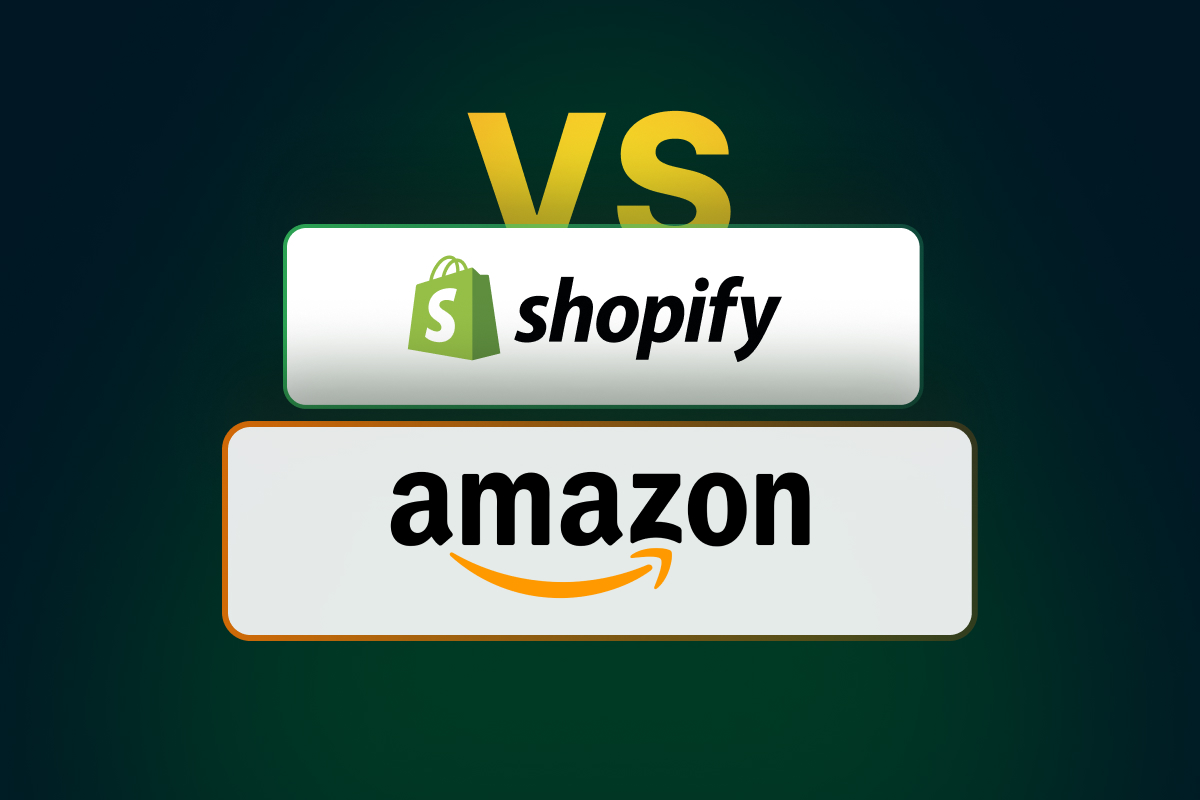Table of Contents
You may have heard of Shopify and Amazon. These are two of the most popular eCommerce platforms and marketplaces worldwide. But how do they compare? Which one is the best?
Shopify vs Amazon is a common question among online retailers, and the answer isn’t simple. Both platforms have advantages and disadvantages. The best choice depends on your goals and preferences.
In this article, we’ll give you an overview of Shopify and Amazon, and compare them on various factors.
Are you ready to find out who wins in the Shopify vs Amazon battle?
Let’s start!
Shopify vs Amazon: Overview
So, what exactly are Shopify and Amazon?
Shopify is an all-in-one eCommerce platform. It allows you to create your online store and sell your products across multiple channels. You can customize your store layout, add products and apps, manage your inventory and orders, and more. Shopify also offers various tools and features to help your business grow (e.g., marketing, analytics, customer support).
💡Learn more about Shopify: Shopify Review – Everything You Should Know About (All Pros and Cons)

Shopify is a popular platform that helps you create online stores and sell products
Meanwhile, Amazon is an eCommerce marketplace. It connects buyers and sellers. You can list your products on Amazon and reach millions of customers worldwide. You can also use Amazon’s services, such as fulfillment, advertising, and payment processing. Amazon handles most of the technical aspects of selling online, so you can focus on your products and customers.
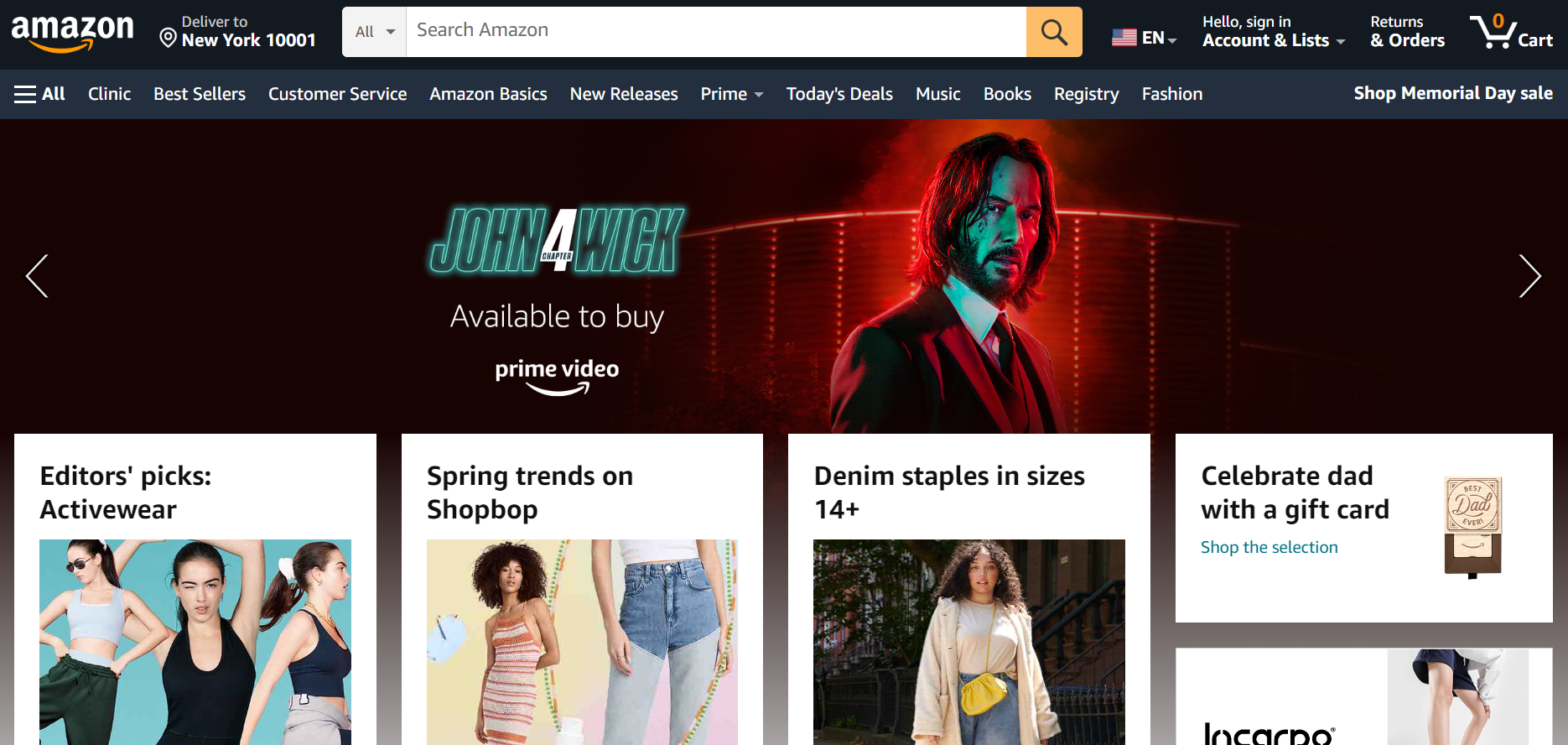
Amazon is a massive online marketplace of sellers and buyers
Both Shopify vs Amazon are very popular among online sellers.
According to reports, in 2022, Shopify had over 2 million merchants, while Amazon had over 9.7 million. Both platforms have huge potential to help you reach new customers and increase your sales.
Shopify vs Amazon: Quick Comparison
Now that you have a general idea of what Shopify and Amazon are, let’s see how they compare on some key aspects of eCommerce.
To make it easier for you, we made a handy table for you to see the main things that make these 2 platforms different or similar:
| Category | Shopify | Amazon | Who wins? |
| Sales Features | More sales features. | Fewer sales features. | Shopify |
| Pricing | Better value for money, especially if you’re a big shop. | Although it is cheaper than Shopify for individual plan, Amazon is significantly more expensive with its Professional plan. | Shopify |
| Apps and Integrations | 8,000+ apps and integrations. | No app plugins. | Shopify |
| Design | More design options than Amazon, such as over 100 free and paid themes in the Shopify Theme Store and full customization of your store’s look and feel. | Less design options than Shopify, such as only a few templates in the Amazon Webstore, and no customization of your store’s look and feel. | Shopify |
| Ease of Use | Easy to create and manage your online store. | Easy to use for listing your products on an existing marketplace. | Draw |
| Support | More support options than Amazon, such as 24/7 phone, email, live chat, social media support, a help center, forums, blogs, podcasts, webinars, and more. | Fewer support options: only email support for sellers (unless you pay extra for phone support) and a help center and forums. | Shopify |
| Scalability | Scalable platform that can handle high traffic and sales but requires upgrading your plan and paying more fees as you grow your business. | Scalable platform that can handle high volumes of traffic and sales but requires you to comply with its strict policies and regulations as you sell more products. | Draw |
| Attracting Customers | Less search volume than Amazon because you’re creating your own brand. | Has an existing market poll of millions of visitors a month. | Amazon |
| Payment Options | Multiple payment options for your customers. Charge your transaction fees if you don’t use Shopify Payments. | Multiple payment options for your customers. Hold your funds for up to 14 days. | Draw |
| Security | A secure platform that protects your data and transactions. Require you to keep your store secure by regularly updating your apps and plugins. | A secure platform that protects your data and transactions. Require you to follow its rules and guidelines to avoid account suspension or termination. | Draw |
As you can see from the table above, Shopify wins in most categories, while Amazon wins in only one.
This shows that Shopify is generally a better option than Amazon for online sellers who want more flexibility, control, and customization over their online store.
But this is not the end of the story. Not all merchants need that. Therefore, we need to look at some details to give you a complete picture of Shopify vs Amazon. In the next section, we will dive deeper into each category and compare Shopify and Amazon in more detail.
Shopify vs Amazon: Detailed Comparison
Shopify and Amazon are not the same kinds of things. Shopify is a platform that helps you build your own online store from scratch. You can customize it and build your brand. Amazon is a place where you can sell your stuff along with other sellers. You can reach a lot of people who are shopping there.
Shopify is great for small to big businesses that want to have their own identity. Amazon is great for individuals to medium businesses who want to sell quickly and easily.
| 💡 Curious to learn more about how Shopify compares to other platforms? Take a quick look at our other Shopify comparisons: |
1. Sales Features
Sales features are the things that help you sell your products online, like how you organize your products, where you sell them, how you check out your customers, and more. They can affect how well you sell online, how happy your customers are, and how much your business grows.
Shopify lets you enjoy many sales features that can help you increase your sales and grow your business. You can sell as many products as you want in any category or niche on your website, social media, Google Shopping, eBay, and more. You can also use Shopify’s feature & apps that send emails to customers who leave your store without buying anything, etc.
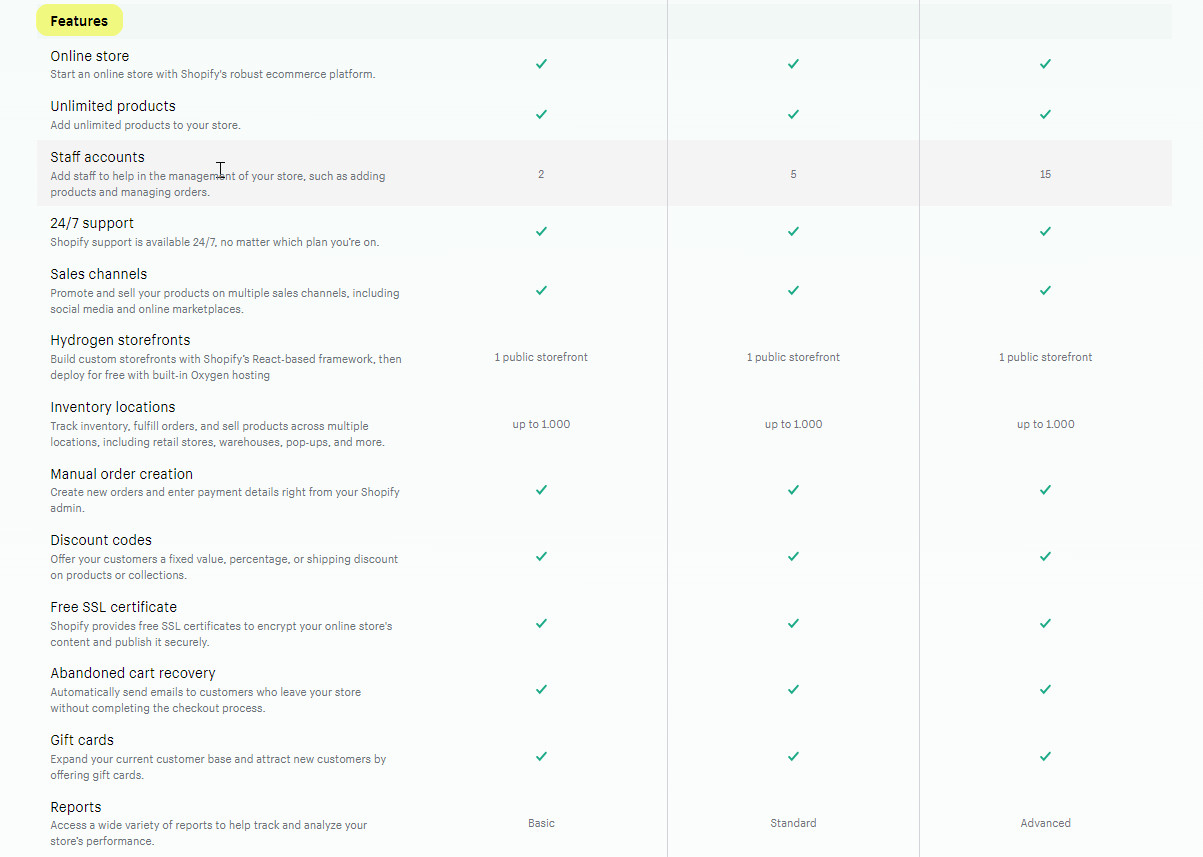
But with Amazon, you don’t get the same sales features that Shopify gives you. You can only sell a few products in some categories or niches and follow Amazon’s rules and regulations when listing your products. Plus, you can only sell on Amazon’s marketplace, so you must fight with other sellers for customers’ attention.
Also, on Amazon, you don’t have the feature that sends emails to customers who leave without buying anything, which means you might miss out on potential sales.
| 🎉 The Verdict:
Shopify beats Amazon in sales features! You can sell more products in more ways and control your store with Shopify. |
2. Pricing
Shopify has three pricing plans:
- Basic plan costs ~$29 a month
- Shopify plan costs ~$79 a month
- Advanced plan costs ~$299 a month
The Basic plan gives you everything you need to make your online store. You can also add apps to improve your store, and upgrade when you want. You might pay more if you use third-party apps. But they help you grow your business and make more money.
Shopify shows yearly prices for its plans, which are cheaper than paying every month. The Basic plan becomes $39 a month if you pay monthly.
💡If you decide to sell on Shopify, you might have to encounter other costs, which we have already talked about in our previous article: Is Shopify Free? How Much Does Shopify Cost?
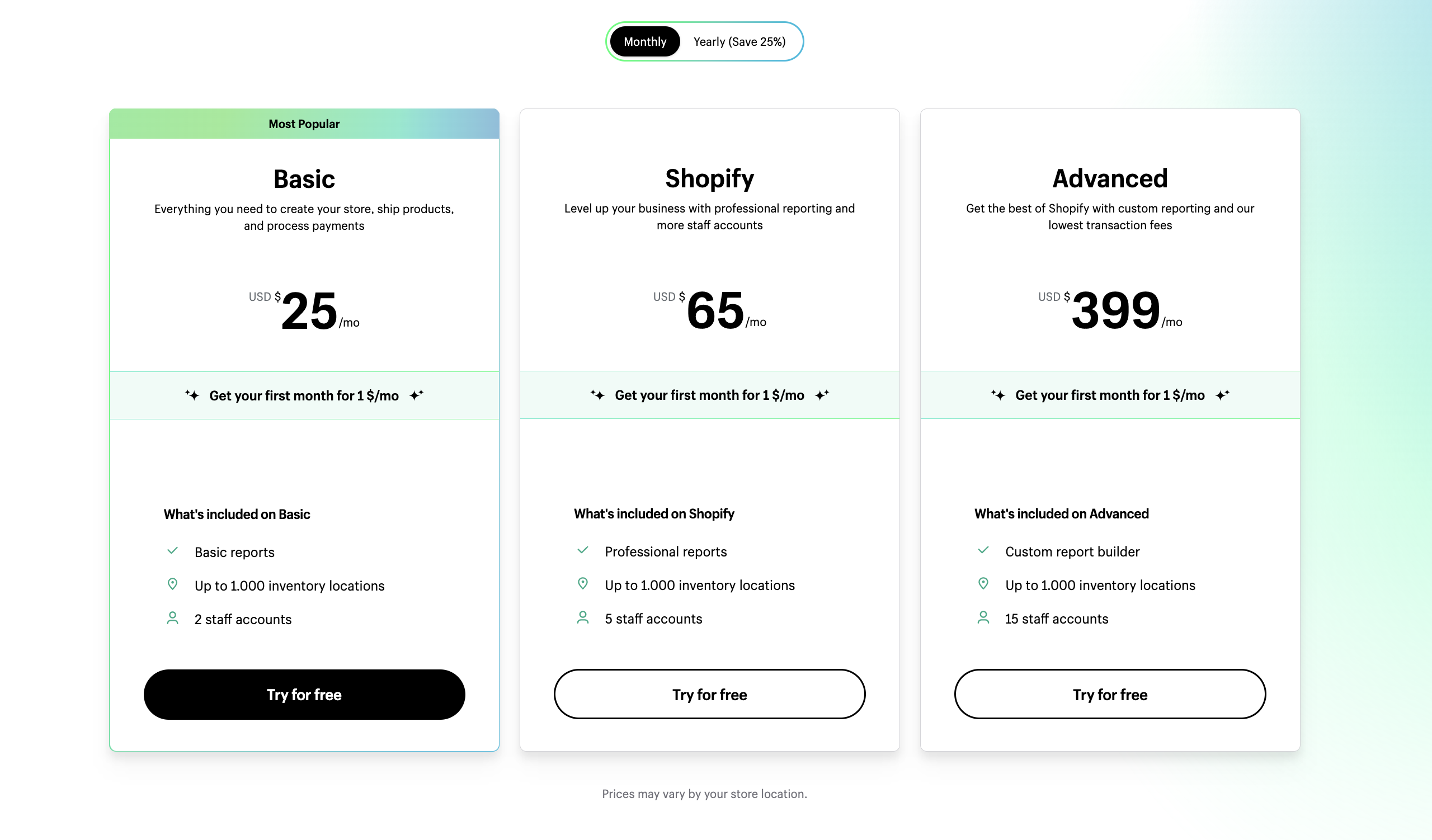
Shopify offers 3 plans for different business types
On the other hand, Amazon only has 2 pricing plans:
- Individual: doesn’t have a monthly fee – you pay $0.99 for each item you sell. You also pay some extra fees, which are different for each category.
- Professional: costs $39.99 a month, plus some extra fees (how much you have to pay depends on what you sell).
The Individual plan is good for people selling less than 40 items monthly. But it has fewer features. For example, you can’t set your own shipping rates.
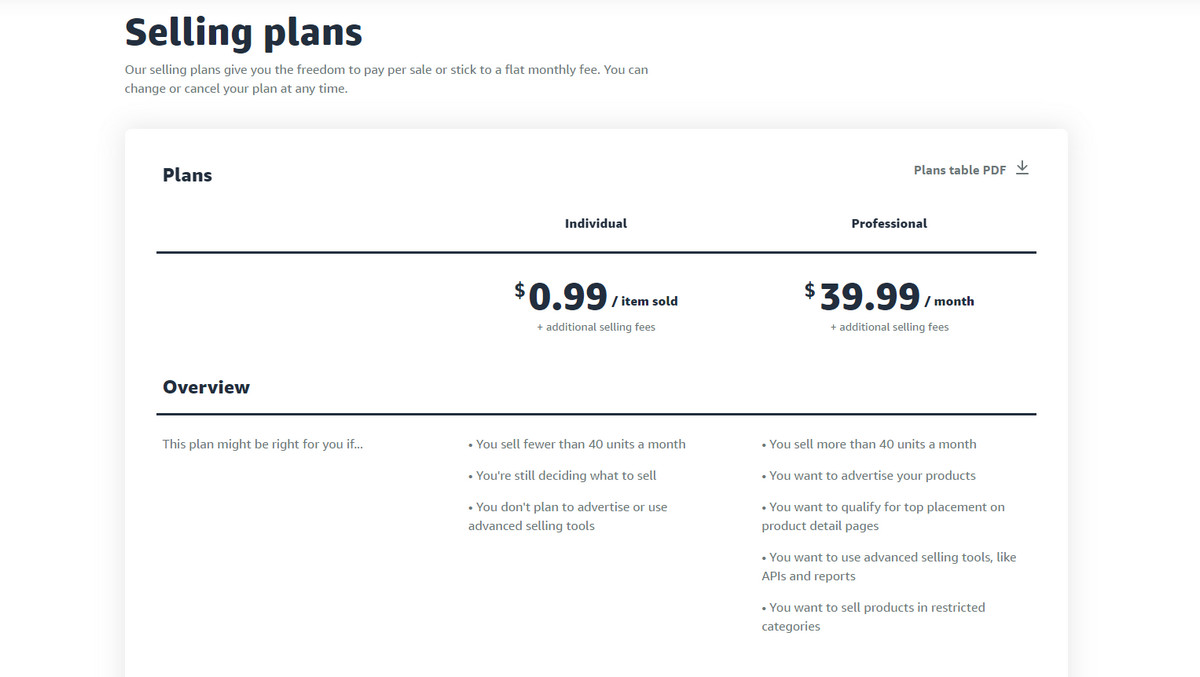
Amazon has Individual and Professional pricing plans
You also pay more if you use Amazon FBA, but that depends on your products and business.
| 🎉 The Verdict:
Shopify wins! Shopify is better than Amazon for most sellers. Amazon’s Individual plan is good for small sellers, but Shopify is cheaper than Amazon’s Professional plan. It also lets you grow your business more easily and clearly. |
3. Apps and Integrations
Apps and integrations are the tools that help you enhance your store’s performance, design, marketing, analytics, customer service, and more. They can help you add features and functionalities to your store that are unavailable on the platform.
With Shopify, you can access over 8,000 apps in the Shopify App Store, which can help you with various aspects of growing your online store, such as inventory management, order fulfillment, shipping tracking, product reviews, social proof, upselling, cross-selling, and more.
You can also integrate your store with popular platforms like Facebook, Instagram, Google Shopping, Mailchimp, Zapier, etc.
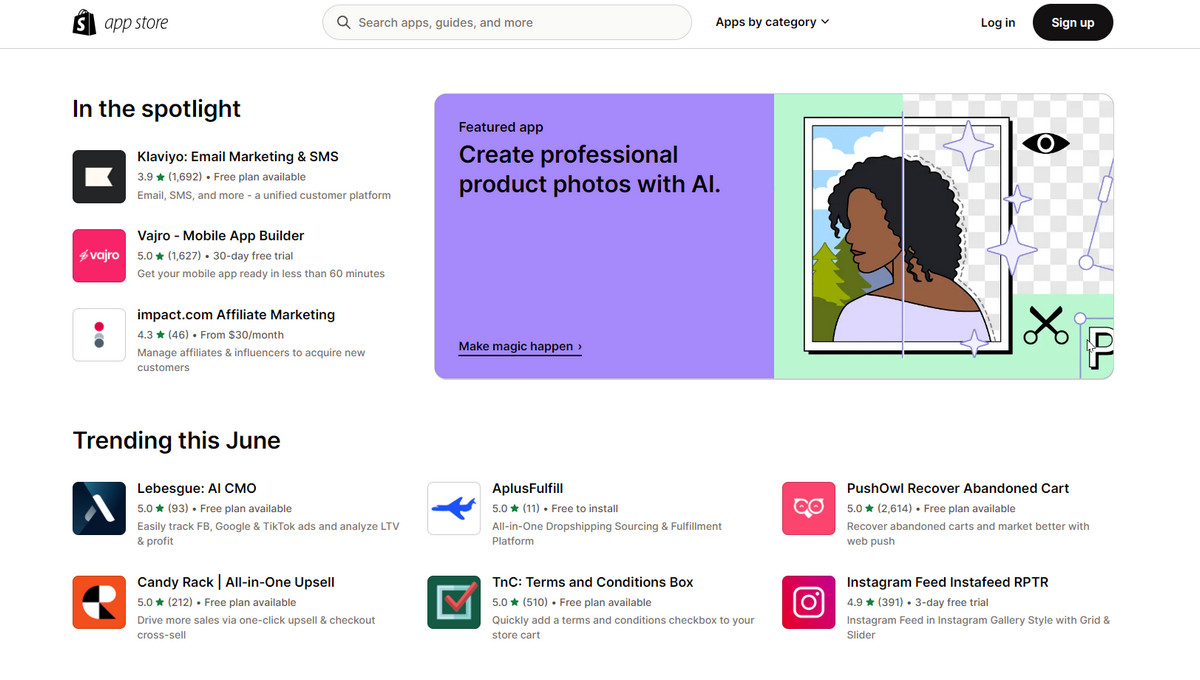
Amazon does not offer plug-in apps to use with their platform. Instead, Amazon introduces various plans, such as Amazon Handmade, Amazon KDP, Amazon Launchpad, etc.
They also offer services like the Fulfillment by Amazon (FBA) program. This program lets you sell to Amazon Prime customers and makes Amazon take care of the storing, wrapping, and sending of your stuff.
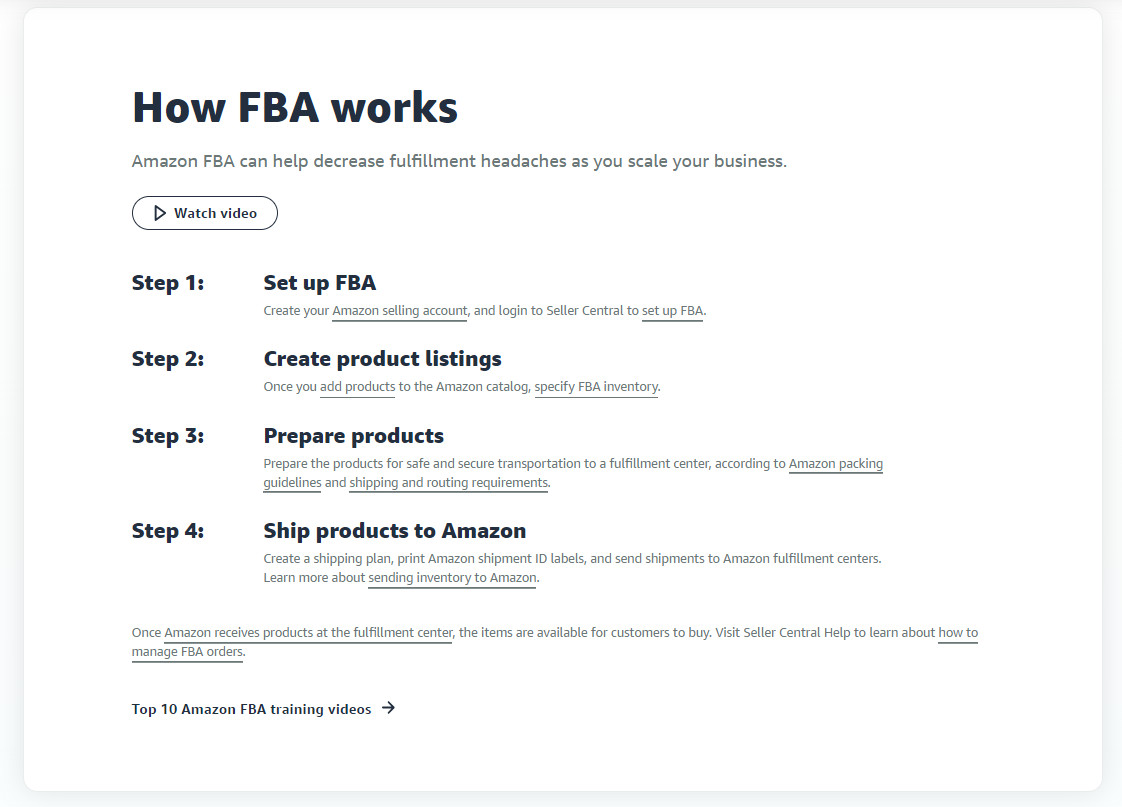
Amazon does not have apps but offers various services like FBA
| 🎉 The Verdict:
Shopify wins in apps and integrations! Shopify has more apps and integrations than Amazon, which gives you more functionality and features for your online store. Shopify is the obvious choice if you want more apps and integrations for your online store. |
4. Design
Design is super important for eCommerce, as it can make your store look good, work well, and sell more. You want a platform that has cool and professional design options without messing up the functionality or performance.
With Shopify, you have over 100 free and paid themes in the Shopify Theme Store, which can fit any business or niche. You can change your store’s look and feel with the drag-and-drop editor or edit the code if you’re tech-savvy. You can also add features and functionalities to your store with apps and plugins.
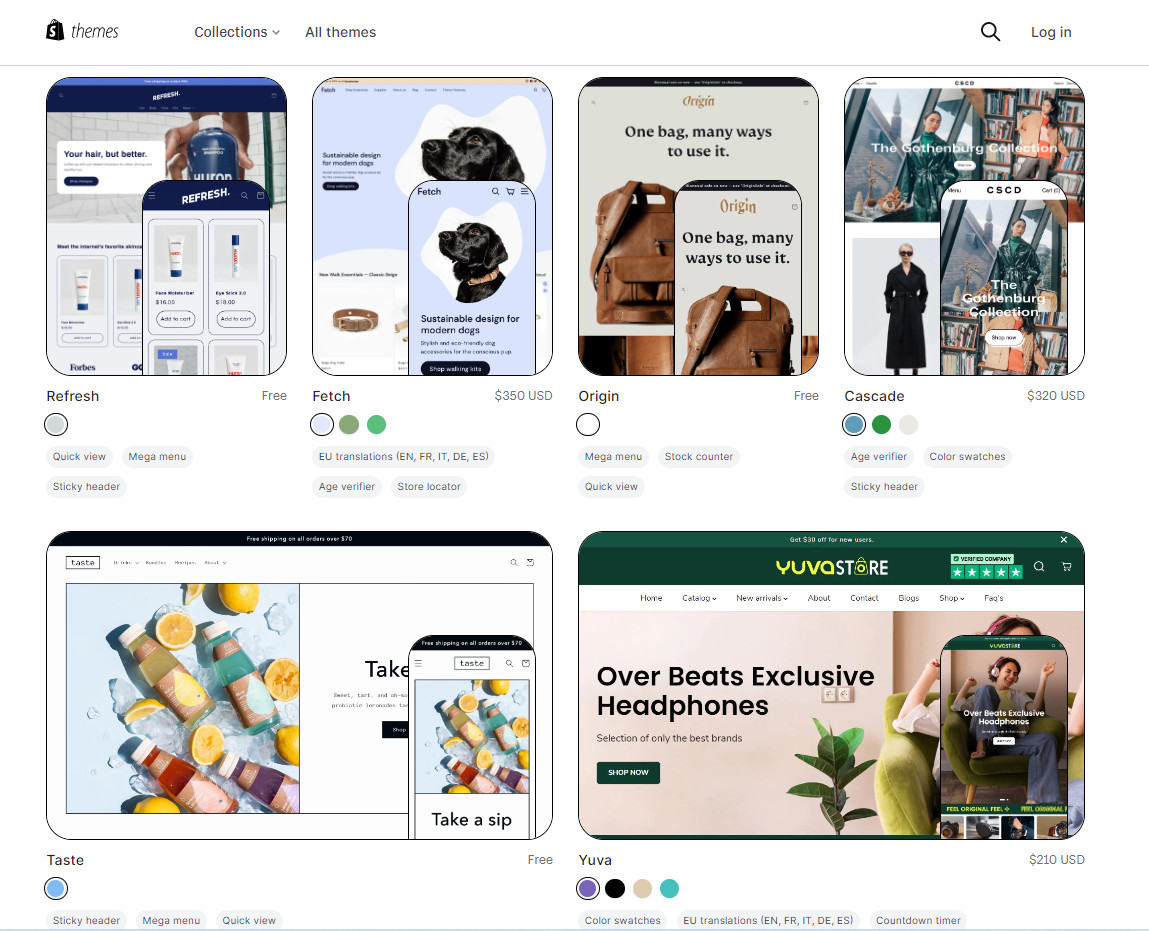
Shopify theme store
But with Amazon, you only have a few templates to choose from in the Amazon Webstore, which are boring and generic. You can’t change your store’s look and feel; you must stick to Amazon’s layout and design. You also can’t add features or functionalities to your store, as you have to use what Amazon gives you.

Amazon store
That can help you sell more stuff, but it also makes it hard for people to remember your brand or tell it apart from others.
| 🎉 The Verdict:
Shopify rocks in design! You can do more with Shopify than Amazon to make your online store look awesome. You can customize and brand your store with Shopify’s design options. Shopify is the winner if you want more design options and creativity for your online store. |
5. Ease of Use
Ease of use is a big deal when choosing an eCommerce platform, as it can affect how well you work and how happy you are. You want a platform that has a simple and easy interface without messing up the functionality or performance.
With Shopify, you can create your online store in minutes without needing any coding or design skills. You can use the easy dashboard to manage everything from inventory to marketing to analytics.
With Amazon, you can also list your products on Amazon’s marketplace in minutes without needing any technical or design skills. You can use the easy interface to manage everything from listings to shipping to payments.
Both platforms are easy for online sellers but have different pros and cons depending on your needs and wants. Shopify is for sellers who want more control and flexibility in their shops. And if you want to sell online with minimum effort, choose Amazon!
| 🎉 The Verdict
It’s a draw regarding ease of use! Shopify and Amazon are both easy to use for online sellers but in different ways. Shopify is great for making and managing your online store, while Amazon is great for listing your products on a ready-made marketplace. |
6. Support
Support is super important for eCommerce, as it can help you solve problems, learn new things, and be happy with your store. You want a reliable and fast support platform without extra fees or long waits. Let’s compare Shopify vs Amazon support:
With Shopify, you can get 24/7 support from Shopify’s team by phone, email, live chat, or social media. You can also use many resources from Shopify’s help center, forums, blogs, podcasts, webinars, and more. You can hire a Shopify Expert to help you with your store’s design, development, marketing, or optimization.
With Amazon, you can get email support from Amazon’s seller team, but only if you pay for a Professional plan ($39.99 per month). If you pay per sale ($0.99), you can only use the help center and forums. You can also pay more for phone support ($40 monthly), but it’s not 24/7. You can also hire an Amazon Service Provider to help you with your store’s listing, fulfillment, advertising, or optimization.
| 🎉 The Verdict:
Shopify has the edge in support! You get more help and guidance from Shopify than from Amazon for your online store. |
7. Scalability
But scaling your business means different things on each platform. Scalability is super crucial for eCommerce, as it can affect growth, profit, and sustainability. You want a platform that supports your business as it grows without slowing down or breaking down.
With Shopify, you can scale your business easily, as Shopify can take any amount of traffic and sales. Shopify has diverse pricing plans that can cover any need. You don’t have to worry about downtime, slow loading, or security issues. Keep in mind that you must pay more fees as you grow your business, like higher subscription, transaction, and credit card fees.
With Amazon, you can also scale your business easily, as Amazon can take any amount of traffic and sales. You don’t have to worry about hosting, maintenance, or security issues. But you must follow more rules and regulations as you sell more products, like product quality standards, customer service standards, and seller performance metrics. You also have to face more competition from other sellers and less control over your brand and customer relationship.
Both platforms are scalable for online sellers but have different trade-offs:
- If you want more flexibility and control over your online store, Shopify is more scalable.
- Amazon is more scalable if you want less hassle and responsibility for online selling.
| 🎉 The Verdict:
The two platforms are equal in scalability! Shopify and Amazon can handle your business growth but have different challenges. Shopify and Amazon are scalable platforms that can deal with lots of traffic and sales. |
8. Marketing / Attracting Customers
Comparing Shopify vs Amazon in terms of marketing features, Amazon has an advantage over Shopify in terms of traffic because the platform has already had a huge amount of traffic each month.

But there’s a catch. Once people are on Amazon, they have to find your products among all the others. And Amazon is also selling its own stuff, so it’s tough to beat them. You still need to follow Amazon’s SEO to rank high in its search results. That way, you can get more customers to choose you over your rivals.
Or you might prefer Shopify. It doesn’t have as many visitors as Amazon. That’s because you create your brand- people must search for your store to find you. This means you need to market yourself well.
But that’s also the good news. Shopify helps you with all of that. All these marketing tools are built-in; you can find more in the Shopify App Store. Emails, social media, selling on different channels, personalized shopping, recovering lost carts, and yes, SEO – all of these are key for growing your brand and getting more customers. If you’re on a tight budget, don’t worry because Shopify has several free apps that can help you supercharge your business for free.
| 🎉 The Verdict:
Amazon wins! It has tons of visitors every month. They come to Amazon looking for stuff to buy. You don’t have to work hard to get them to your store – they’re already there. You don’t have to worry about SEO or email marketing – just focus on your products and orders. |
9. Payment Options
Payment options let your customers pay for their purchases online, like credit cards, debit cards, PayPal, Amazon Pay, and more. They can affect how happy your customers are, how well your store sells, and how fast you get your money.
With Shopify, you can offer your customers many payment options, like credit cards, debit cards, PayPal, Amazon Pay, and more. You can also use Shopify Payments as your payment processor, which works great with your store.
Be aware: You must pay transaction fees if you don’t use Shopify Payments as your payment processor. Depending on your plan, the fees go from 0.5% to 2%. You also have to pay credit card fees of 2.9% + $0.30 per transaction (or lower if you use Shopify Payments).
With Amazon, you can also offer your customers many payment options, like credit cards, debit cards, PayPal, Amazon Pay, and more.
You can use Amazon Pay as your payment processor, which works great with your store. You don’t have to pay transaction fees using Amazon Pay as your payment processor. But you must wait up to 14 days to get your money from Amazon Pay.
And if you don’t use Amazon Pay, you only pay credit card fees of 2.9% + $0.30 per transaction. In this case, no lead time to get your money.
Both platforms offer lots of payment options for your customers. Still, they have different trade-offs regarding payment processing:
- If you want more control over your payments and to get your money faster, Shopify is better.
- Amazon is better if you want to save money on fees and payment charges.
| 🎉 The Verdict:
It’s a draw! With both Amazon vs Shopify, you can offer your customers many ways to pay for their purchases online, like credit cards, debit cards, PayPal, Amazon Pay, and more. But they have different pros and cons when it comes to payment processing. |
10. Security
Security is super important for eCommerce, as it can affect how trustworthy, reputable, and liable you are. You want a high-level security platform for your online store and customers without slowing down or messing up.
With Shopify, you can enjoy high-level security for your online store and customers. Shopify uses SSL encryption to keep your store’s data and transactions safe and PCI compliance to protect your customers’ credit card info.
However, you must keep your store secure by regularly updating your apps and plugins and following the best password protection, backup, and recovery practices.
Amazon also offers the same level of protection. Also, remember that when selling on Amazon, you must follow Amazon’s rules and guidelines to avoid account suspension or termination, such as product quality standards, customer service standards, and seller performance metrics.
| 🎉 The Verdict:
The two platforms are equal in security! Shopify and Amazon are both secure platforms that keep your data and transactions safe. They use SSL encryption and PCI compliance to protect your online store and customers. But they have different roles when it comes to security. |
Shopify vs Amazon: All the Pros and Cons
Now you know how Shopify vs Amazon are different in various aspects of eCommerce, we bet you somehow have an idea of the pros and cons of the two platforms.
But if you want a quick overview of each platform’s pros and cons, look at these tables below:
1. Shopify Pros & Cons
| Pros | Cons |
|
|
| Who should use Shopify | |
| If you’re the type of person who likes to do things your own way, Shopify is for you. Shopify lets you create your own online store from scratch and customize it however you want. You can choose your own design, features, products, and brand.
Plus, Shopify is a great eCommerce platform that helps you with everything you need to run your online business. Whether you’re a beginner or a pro, Shopify has your back. Shopify is for the DIYers who want to stand out from the crowd! |
|
2. Amazon Pros & Cons
| Pros | Cons |
|
|
| Who should use Amazon | |
| If you’re looking for a quick and easy way to sell online, Amazon is for you. Amazon is the giant online marketplace that everyone knows and loves. You can reach millions of customers immediately without building your own store.
Amazon is also a cheap option for small sellers who don’t want to pay any fees upfront. You only pay $0.99 per sale. The downside is that you’ll have to compete with tons of other sellers who may offer the same products as you. But if you don’t mind that, Amazon is for bargain hunters who want to save time and money! |
|
Shopify vs Amazon: Who Wins?
Overall, we recommend Shopify over Amazon for online sellers who want more flexibility, control, and customization over their online store. Shopify offers more sales features, apps and integrations, design options, support options, marketing tools, and SEO features than Amazon. Shopify also gives you more control over your payments and faster access to your funds.
Amazon is not a bad option for online sellers who want to reach millions of customers who trust and prefer Amazon. However, Amazon has fewer functionality and features than Shopify. Amazon also gives you less control and flexibility over your online selling. You have to follow Amazon’s rules and regulations when listing your products. You also have to share your customers’ data and loyalty with Amazon.
But you don’t have to choose between Shopify vs Amazon. You can integrate Amazon into your Shopify store with Shopify built-in tools. This way, you can sell your products on your website and Amazon’s marketplace. You can also sync your inventory and orders across both platforms.
We hope this article has helped you decide which platform is better for your online selling needs. Whether you choose Shopify or Amazon, we wish you happy selling!
